Campus/People
-
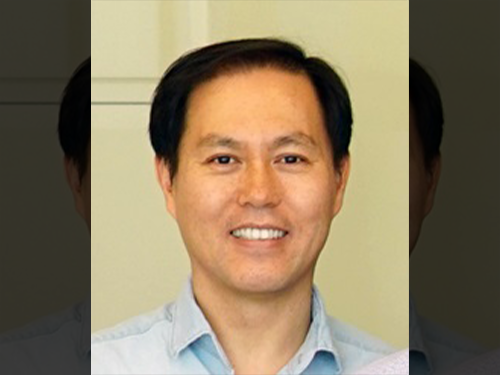 Professor Jin Woo Kim Wins the 14th Macrogen Scientist Award
Professor Jin Woo Kim of the Department of Biological Sciences at KAIST received the 14th Macrogen Scientist Award at the 2017 KSMCB International Conference held in COEX on September 12, 2017.
The award is given by the Korean Society for Molecular and Cellular Biology (KSMCB) and sponsored by Macrogen, a service provider of genome research. The award was established in 2004 to recognize biological scientists who have accomplished excellent performance in the field of basic life sciences.
Professor Kim has achieved outstanding research performances on nerve development, such as identifying the cause of senile retinal degenerative disease and finding retinal nerve cells that distinguish light and darkness in dark conditions.
Recently, he discovered intercellular communication, which controls the development of retinal neurons. His findings have contributed to addressing the principles of maintenance and regeneration of retinal neurons.
Since joining KAIST, he has presented approximately 20 papers and published in numerous international journals including Cell Reports, Genes and Development, and EMBO Journal. Moreover, he delivered special lectures at international conferences, universities, and institutes around the world.
2017.09.14 View 9553
Professor Jin Woo Kim Wins the 14th Macrogen Scientist Award
Professor Jin Woo Kim of the Department of Biological Sciences at KAIST received the 14th Macrogen Scientist Award at the 2017 KSMCB International Conference held in COEX on September 12, 2017.
The award is given by the Korean Society for Molecular and Cellular Biology (KSMCB) and sponsored by Macrogen, a service provider of genome research. The award was established in 2004 to recognize biological scientists who have accomplished excellent performance in the field of basic life sciences.
Professor Kim has achieved outstanding research performances on nerve development, such as identifying the cause of senile retinal degenerative disease and finding retinal nerve cells that distinguish light and darkness in dark conditions.
Recently, he discovered intercellular communication, which controls the development of retinal neurons. His findings have contributed to addressing the principles of maintenance and regeneration of retinal neurons.
Since joining KAIST, he has presented approximately 20 papers and published in numerous international journals including Cell Reports, Genes and Development, and EMBO Journal. Moreover, he delivered special lectures at international conferences, universities, and institutes around the world.
2017.09.14 View 9553 -
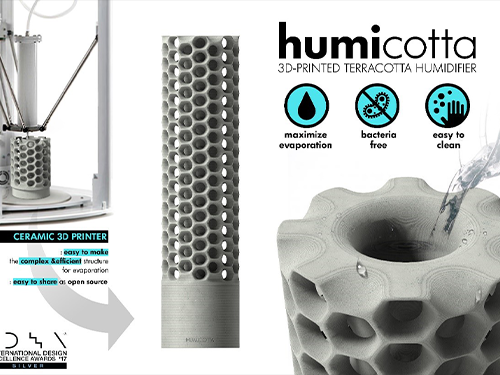 Humicotta Wins the Silver Prize at the 2017 IDEA
The 3D-printed ceramic humidifier made by the research team led by Professor Sang-Min Bae won the silver prize at the 2017 International Design Excellence Awards (IDEA). Professor Bae’s ID+IM team was also listed as winners of three more appropriate technology designs at the IDEA. The awards, sponsored by the Industrial Designers Society of America, are one of the three prestigious design awards including the Red Dot Design Award and the iF Design Award in Germany.
The silver prize winner in the category of home and bath, Humicotta is an energy-efficient, bacteria free, and easy to clean humidifier. It includes a base module and filter. The base is a cylindrical pedestal with a built-in fan on which the filter is placed. The filter is a 3D-printed honeycomb structure made of diatomite. When water is added, the honeycomb structure and porous terracotta maximize natural humidification. It also offers an open platform service that customizes the filters or provides files that users can use their own 3D printer.
Professor Bae’s team has worked on philanthropy design using appropriate technology as their main topic for years. Their designs have been recognized at prestigious global design awards events, winning more than 50 prizes with innovative designs made for addressing various global and social problems.
The Light Funnel is a novel type of lighting device designed for off-grid areas of Africa. It helps to maximize the natural light effect in the daytime without any drastic home renovations. It consists of a transparent acrylic sphere and a reflective pathway. After filling the acrylic sphere with water and placing it on a rooftop, sunlight passes into the house through the water inside the sphere. It provides a lighted environment nine times brighter than without it. Also, once installed, it can be used almost permanently.
The Maasai Smart Cane is made using wood sticks purchased through fair trade with the Maasai tribe. GPS is installed into the grip of the birch-tree cane, so that cane users can send a signal when in an emergency situation. All of the proceeds of this product go to the tribe.
S.Cone is a first aid kit made in collaboration with Samsung Fire and Marine Insurance. The traffic cone-shaped kit is designed to help users handle an emergency situation intact and safe. The S.Cone has unique versions for fires, car accidents, and marine accidents. For example, the S.Cone for fires is equipped with a small fire extinguisher, smoke mask, and fire blanket. The cap of the S.Cone also functions as an IoT station connecting the fire and gas detector with smart phones.
Professor Bae said of his team’s winning design products, “By making the data public, any person can design their own humidifier if they have access to a 3D-printer. We want it to be a very accessible product for the public. The Light Funnel and Maasai Smart Cane are designed for economically-marginalized populations and the elderly. We will continue to make the best designed products serving the marginalized 90% of the population around the world.”
2017.09.14 View 27327
Humicotta Wins the Silver Prize at the 2017 IDEA
The 3D-printed ceramic humidifier made by the research team led by Professor Sang-Min Bae won the silver prize at the 2017 International Design Excellence Awards (IDEA). Professor Bae’s ID+IM team was also listed as winners of three more appropriate technology designs at the IDEA. The awards, sponsored by the Industrial Designers Society of America, are one of the three prestigious design awards including the Red Dot Design Award and the iF Design Award in Germany.
The silver prize winner in the category of home and bath, Humicotta is an energy-efficient, bacteria free, and easy to clean humidifier. It includes a base module and filter. The base is a cylindrical pedestal with a built-in fan on which the filter is placed. The filter is a 3D-printed honeycomb structure made of diatomite. When water is added, the honeycomb structure and porous terracotta maximize natural humidification. It also offers an open platform service that customizes the filters or provides files that users can use their own 3D printer.
Professor Bae’s team has worked on philanthropy design using appropriate technology as their main topic for years. Their designs have been recognized at prestigious global design awards events, winning more than 50 prizes with innovative designs made for addressing various global and social problems.
The Light Funnel is a novel type of lighting device designed for off-grid areas of Africa. It helps to maximize the natural light effect in the daytime without any drastic home renovations. It consists of a transparent acrylic sphere and a reflective pathway. After filling the acrylic sphere with water and placing it on a rooftop, sunlight passes into the house through the water inside the sphere. It provides a lighted environment nine times brighter than without it. Also, once installed, it can be used almost permanently.
The Maasai Smart Cane is made using wood sticks purchased through fair trade with the Maasai tribe. GPS is installed into the grip of the birch-tree cane, so that cane users can send a signal when in an emergency situation. All of the proceeds of this product go to the tribe.
S.Cone is a first aid kit made in collaboration with Samsung Fire and Marine Insurance. The traffic cone-shaped kit is designed to help users handle an emergency situation intact and safe. The S.Cone has unique versions for fires, car accidents, and marine accidents. For example, the S.Cone for fires is equipped with a small fire extinguisher, smoke mask, and fire blanket. The cap of the S.Cone also functions as an IoT station connecting the fire and gas detector with smart phones.
Professor Bae said of his team’s winning design products, “By making the data public, any person can design their own humidifier if they have access to a 3D-printer. We want it to be a very accessible product for the public. The Light Funnel and Maasai Smart Cane are designed for economically-marginalized populations and the elderly. We will continue to make the best designed products serving the marginalized 90% of the population around the world.”
2017.09.14 View 27327 -
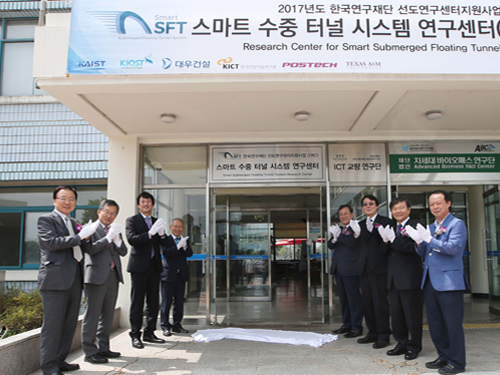 Research Center for Smart Submerged Floating Tunnel Systems Opens
(Distinguished guests including President Shin (fourth from the right) and Director Lee (third from left) at the opening ceremony)
The Research Center for a Smart Submerged Floating Tunnel Systems was recently established at KAIST with the purpose of taking the lead in developing fundamental and applicable technology for submerged floating tunnels as well as fostering creative and talented people. Haeng-Ki Lee, a professor in the Department of Civil & Environmental Engineering at KAIST is heading the center.
KAIST held its opening ceremony on September 7, 2017 in the Applied Engineering Building located on the main campus.
Distinguished guests, including KAIST president Sung-Chul Shin, the President of the Korea Institute of Ocean Science and Technology Gi-Hoon Hong, the President of the Korean Society of Civil Engineering Young-Seok Park, and the Director in the Division of Engineering at the National Research Foundation of Korea Joong-Kon Park attended the ceremony.
The National Research Foundation of Korea provides Engineering Research Center (ERC) projects which find and foster groups with outstanding research performance in a field of engineering. The projects support these groups so that they can strengthen their global competitiveness while enhancing national competence in basic research.
The ‘Research Center for Smart Submerged Floating Tunnel Systems’ was selected as one of the ERC projects in 2017. For the next seven years, the research center will work to develop a submerged floating tunnel system resistant depths greater than 100 meters.
To achieve its goal, the center has defined crucial research topics including: i) a structural analysis program and integrated design technology specific for submerged floating tunnel systems, ii) high-durability marine construction materials and submerged construction integrated systems, and iii) safety and maintenance integrated technology for smart submerged floating tunnel systems.
The ‘Research Center for Smart Submerged Floating Tunnel Systems’ will devote itself to developing a variety of fundamental and applicable technology that will be leading global maritime construction. Moreover, it will concentrate on fostering professional research manpower in related areas.
The Director of the Center Lee said, “The center will cooperate with KAIST researchers who are experts in various fields, including structures, materials, construction, and maritime research. Based on this collaboration, the center will contribute to achieving autonomous technologies by developing fundamental and applicable technology related with submerged floating tunnel systems. It will also take the role of a leading global research hub in the field of submerged floating tunnels as well as construction technologies.”
2017.09.07 View 10140
Research Center for Smart Submerged Floating Tunnel Systems Opens
(Distinguished guests including President Shin (fourth from the right) and Director Lee (third from left) at the opening ceremony)
The Research Center for a Smart Submerged Floating Tunnel Systems was recently established at KAIST with the purpose of taking the lead in developing fundamental and applicable technology for submerged floating tunnels as well as fostering creative and talented people. Haeng-Ki Lee, a professor in the Department of Civil & Environmental Engineering at KAIST is heading the center.
KAIST held its opening ceremony on September 7, 2017 in the Applied Engineering Building located on the main campus.
Distinguished guests, including KAIST president Sung-Chul Shin, the President of the Korea Institute of Ocean Science and Technology Gi-Hoon Hong, the President of the Korean Society of Civil Engineering Young-Seok Park, and the Director in the Division of Engineering at the National Research Foundation of Korea Joong-Kon Park attended the ceremony.
The National Research Foundation of Korea provides Engineering Research Center (ERC) projects which find and foster groups with outstanding research performance in a field of engineering. The projects support these groups so that they can strengthen their global competitiveness while enhancing national competence in basic research.
The ‘Research Center for Smart Submerged Floating Tunnel Systems’ was selected as one of the ERC projects in 2017. For the next seven years, the research center will work to develop a submerged floating tunnel system resistant depths greater than 100 meters.
To achieve its goal, the center has defined crucial research topics including: i) a structural analysis program and integrated design technology specific for submerged floating tunnel systems, ii) high-durability marine construction materials and submerged construction integrated systems, and iii) safety and maintenance integrated technology for smart submerged floating tunnel systems.
The ‘Research Center for Smart Submerged Floating Tunnel Systems’ will devote itself to developing a variety of fundamental and applicable technology that will be leading global maritime construction. Moreover, it will concentrate on fostering professional research manpower in related areas.
The Director of the Center Lee said, “The center will cooperate with KAIST researchers who are experts in various fields, including structures, materials, construction, and maritime research. Based on this collaboration, the center will contribute to achieving autonomous technologies by developing fundamental and applicable technology related with submerged floating tunnel systems. It will also take the role of a leading global research hub in the field of submerged floating tunnels as well as construction technologies.”
2017.09.07 View 10140 -
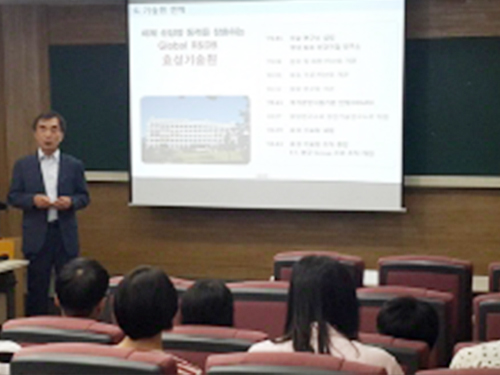 Hyosung R&DB Labs to Teach Special Class on High Molecule Chemistry for the Fall Semester
The Department of Chemistry in collaboration with the Hyosung Group’s R&DB Labs will open a ‘special class on high molecule chemistry’ for Masters and Ph.D. candidates. The class, led by researchers at Hyosung’s R&D think tank, will provide the latest market and technology trends in the molecule chemical industry during the fall semester.
Hyosung joined this special industry program in an effort to enhance students’ hands-on understanding of new technologies that will emerge in the global market. During the semester, Hyosung plans to present the technology portfolios on their brand new materials of TAC film, membrane, and carbon fiber as well as the existing products leading the world in market share such as spandex, tire cords.
Hyosung plans to recruit students who previously took courses led by Hyosung researchers. President Tu-Won Chang of Hyosung R&DB said, “This program is designed to foster highly qualified R&D personnel especially catering to our company’s needs and market demands. We will continue to share our company’s market analysis and R&D know-how with outstanding universities.
2017.09.07 View 5469
Hyosung R&DB Labs to Teach Special Class on High Molecule Chemistry for the Fall Semester
The Department of Chemistry in collaboration with the Hyosung Group’s R&DB Labs will open a ‘special class on high molecule chemistry’ for Masters and Ph.D. candidates. The class, led by researchers at Hyosung’s R&D think tank, will provide the latest market and technology trends in the molecule chemical industry during the fall semester.
Hyosung joined this special industry program in an effort to enhance students’ hands-on understanding of new technologies that will emerge in the global market. During the semester, Hyosung plans to present the technology portfolios on their brand new materials of TAC film, membrane, and carbon fiber as well as the existing products leading the world in market share such as spandex, tire cords.
Hyosung plans to recruit students who previously took courses led by Hyosung researchers. President Tu-Won Chang of Hyosung R&DB said, “This program is designed to foster highly qualified R&D personnel especially catering to our company’s needs and market demands. We will continue to share our company’s market analysis and R&D know-how with outstanding universities.
2017.09.07 View 5469 -
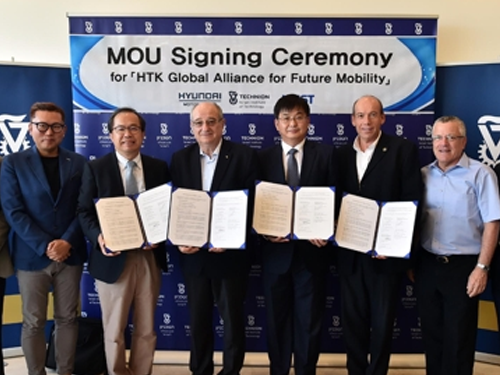 KAIST Partners with Technion and Hyundai Motors for Future Mobility Technology Development
(KAIST Associate Vice President of Research Joung-Ho Kim(third from left) poses with Technion President Pereta Lavie and CTO Tae Won Im of Hyundai Motors)
KAIST has partnered with the Israel Institute of Technology, Technion, and Hyundai Motors to take the lead in the field of future mobility technologies. The three parties signed a consortium of global alliance for future mobility partnership at Technion on Sept. 5. KAIST Associate Vice President of Research Kim Joung-Ho, Hyundai Motor’s Central Advanced Research and Engineering CTO Tae Won Lim, and Technion President Peretz Lavie signed the MOU.
The three parties agreed to conduct joint research on hi-tech mobility areas including self-driving systems, cyber security, and AI in mobility. With the signing of the consortium, KAIST's technology in AI, semiconductors, and autonomous cars will produce synergy with Technion’s connected car solutions, advancing Hyundai Motor's competitiveness in the future mobility market.
In addition to the consortium, the three parties will set-up a startup consulting committee, which will provide consulting services for nurturing venture startups with creative ideas and outstanding technological prowess in their host countries.
2017.09.07 View 6795
KAIST Partners with Technion and Hyundai Motors for Future Mobility Technology Development
(KAIST Associate Vice President of Research Joung-Ho Kim(third from left) poses with Technion President Pereta Lavie and CTO Tae Won Im of Hyundai Motors)
KAIST has partnered with the Israel Institute of Technology, Technion, and Hyundai Motors to take the lead in the field of future mobility technologies. The three parties signed a consortium of global alliance for future mobility partnership at Technion on Sept. 5. KAIST Associate Vice President of Research Kim Joung-Ho, Hyundai Motor’s Central Advanced Research and Engineering CTO Tae Won Lim, and Technion President Peretz Lavie signed the MOU.
The three parties agreed to conduct joint research on hi-tech mobility areas including self-driving systems, cyber security, and AI in mobility. With the signing of the consortium, KAIST's technology in AI, semiconductors, and autonomous cars will produce synergy with Technion’s connected car solutions, advancing Hyundai Motor's competitiveness in the future mobility market.
In addition to the consortium, the three parties will set-up a startup consulting committee, which will provide consulting services for nurturing venture startups with creative ideas and outstanding technological prowess in their host countries.
2017.09.07 View 6795 -
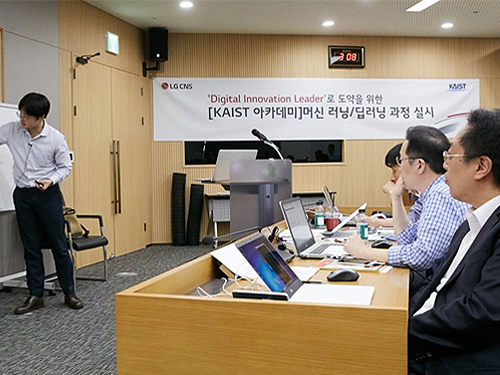 KAIST AI Academy for LG CNS Employees
The Department of Industrial & Systems Engineering (Graduate School of Knowledge Service Engineering) at KAIST has collaborated with LG CNS to start a full-fledged KAIST AI Academy course after the two-week pilot course for employees of LG CNS, a Korean company specializing in IT services.
Approximately 100 employees participated in the first KAIST AI Academy course held over two weeks from August 24 to September 1. LG CNS is planning to enroll a total of 500 employees in this course by the end of the year.
Artificial intelligence is widely recognized as essential technology in various industries. In that sense, the KAIST AI Academy course was established to reinforce both the AI technology and the business ability of the company. In addition, it aims at leading employees to develop new business using novel technologies. The main contents of this course are as follows: i) discussing AI technology development and its influence on industries; ii) understanding AI technologies and acquiring the major technologies applicable to business; and iii) introducing cases of AI applications and deep learning.
During the course, seven professors with expertise in AI deep learning from the Department of Industrial & Systems Engineering (Graduate School of Knowledge Service Engineering), including Jae-Gil Lee and Jinkyoo Park will be leading the class, including practical on-site educational programs.
Based on the accumulated business experience integrated with the latest AI technology, LG CNS has been making an effort to find new business opportunities to support companies that are hoping to make digital innovations.
The company aims to reinforce the AI capabilities of its employees and is planning to upgrade the course in a sustainable manner. It will also foster outside manpower by expanding the AI education to its clients who pursue manufacturing reinforcement and innovation in digital marketing.
Seong Wook Lee, the Director of the AI and Big Data Business Unit said, “As AI plays an important role in business services, LG CNS decided to open the KAIST AI Academy course to deliver better value to our clients by incorporating our AI-based business cases and KAIST’s up-to-date knowledge.”
2017.09.06 View 7852
KAIST AI Academy for LG CNS Employees
The Department of Industrial & Systems Engineering (Graduate School of Knowledge Service Engineering) at KAIST has collaborated with LG CNS to start a full-fledged KAIST AI Academy course after the two-week pilot course for employees of LG CNS, a Korean company specializing in IT services.
Approximately 100 employees participated in the first KAIST AI Academy course held over two weeks from August 24 to September 1. LG CNS is planning to enroll a total of 500 employees in this course by the end of the year.
Artificial intelligence is widely recognized as essential technology in various industries. In that sense, the KAIST AI Academy course was established to reinforce both the AI technology and the business ability of the company. In addition, it aims at leading employees to develop new business using novel technologies. The main contents of this course are as follows: i) discussing AI technology development and its influence on industries; ii) understanding AI technologies and acquiring the major technologies applicable to business; and iii) introducing cases of AI applications and deep learning.
During the course, seven professors with expertise in AI deep learning from the Department of Industrial & Systems Engineering (Graduate School of Knowledge Service Engineering), including Jae-Gil Lee and Jinkyoo Park will be leading the class, including practical on-site educational programs.
Based on the accumulated business experience integrated with the latest AI technology, LG CNS has been making an effort to find new business opportunities to support companies that are hoping to make digital innovations.
The company aims to reinforce the AI capabilities of its employees and is planning to upgrade the course in a sustainable manner. It will also foster outside manpower by expanding the AI education to its clients who pursue manufacturing reinforcement and innovation in digital marketing.
Seong Wook Lee, the Director of the AI and Big Data Business Unit said, “As AI plays an important role in business services, LG CNS decided to open the KAIST AI Academy course to deliver better value to our clients by incorporating our AI-based business cases and KAIST’s up-to-date knowledge.”
2017.09.06 View 7852 -
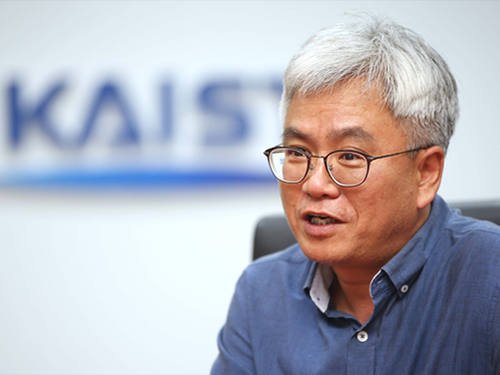 Professor Dae-Sik Im to Head the Science, Technology and Innovation Office at the Ministry of Science & ICT
(Professor Dae-Sik Im of the Department of Biological Sciences)
Professor Dae-Sik Im of the Department of Biological Sciences, a renowned molecular cell biologist, was named to head the Science, Technology and Innovation Office in the Ministry of Science and ICT on August 31. He will be responsible for the oversight of national R&D projects as well as budget deliberation. Joining the KAIST faculty in 2002, he led the Creative Research Center of Cell Division and Differentiation at KAIST.
Announcing the nomination of Professor Im, Cheong Wa Dae spokesman Park Soo-Hyun said, “Professor Im will be the best person to lead the innovation of the research infrastructure system for basic research studies. We believe that his expertise and leadership will make a significant impact in enhancing the nation’s science and technology competitiveness. This vice minister position in the Ministry of Science and ICT was newly created in an effort to enhance national science and technology initiatives by President Moon Jae-In.
Professor Im said at the news conference, “I would like to make a sustainable, as well as credible, system ensuring the ingenuity of scientists in Korean labs. To this end, I will make every effort to enhance Korea’s innovative research environment in a way to maximize research achievements.”
2017.09.03 View 9759
Professor Dae-Sik Im to Head the Science, Technology and Innovation Office at the Ministry of Science & ICT
(Professor Dae-Sik Im of the Department of Biological Sciences)
Professor Dae-Sik Im of the Department of Biological Sciences, a renowned molecular cell biologist, was named to head the Science, Technology and Innovation Office in the Ministry of Science and ICT on August 31. He will be responsible for the oversight of national R&D projects as well as budget deliberation. Joining the KAIST faculty in 2002, he led the Creative Research Center of Cell Division and Differentiation at KAIST.
Announcing the nomination of Professor Im, Cheong Wa Dae spokesman Park Soo-Hyun said, “Professor Im will be the best person to lead the innovation of the research infrastructure system for basic research studies. We believe that his expertise and leadership will make a significant impact in enhancing the nation’s science and technology competitiveness. This vice minister position in the Ministry of Science and ICT was newly created in an effort to enhance national science and technology initiatives by President Moon Jae-In.
Professor Im said at the news conference, “I would like to make a sustainable, as well as credible, system ensuring the ingenuity of scientists in Korean labs. To this end, I will make every effort to enhance Korea’s innovative research environment in a way to maximize research achievements.”
2017.09.03 View 9759 -
 KAIST to Open the Meditation Research Center
KAIST announced that it will open its Meditation Research Center next June. The center will serve as a place for the wellness of KAIST community as well as for furthering the cognitive sciences and its relevant convergence studies.
For facilitating the center, KAIST signed an MOU with the Foundation Academia Platonica in Seoul, an academy working for enriching the humanities and insight meditation on Aug.31. The Venerable Misan, a Buddhist monk well-known for his ‘Heart Smile Meditation’ program, will head the center.
The center will also conduct convergence research on meditation, which will translate into brain imaging, cognitive behavior, and its psychological effects. Built upon the research, the center expects to publish textbooks on meditation and will distribute them to the public and schools in an effort to widely disseminate the benefits of meditation.
As mindful meditation has become mainstream and more extensively studied, growing evidence suggests multiple psychological and physical benefits of these mindfulness exercises as well as for similar practices. Mind-body practices like meditation have been shown to reduce the body’s stress response by strengthening the relaxation response and lowering stress hormones.
The Venerable Misan, a Ph.D in philosophy from Oxford University, also serves as the director of the Sangdo Meditation Center and a professor at Joong-Ang Sangha University, a higher educational institution for Buddhist monks.
Monk Misan said that meditation will play a crucial part in educating creative students with an empathetic mindset. He added, “Hi-tech companies in Silicon Valley such as Google and Intel have long introduced meditation programs for stress management. Such practices will enhance the wellness of employees as well as their working efficiency.”
President Sung-Chul Shin said of the opening of the center, “From long ago, many universities in foreign countries including Havard, Stanford, Oxfor universities and the Max Planck Institute in Germany have applied scientific approaches to meditation and installed meditation centers. I am pleased to open our own center next year and I believe that it will bring more diverse opportunities for advancing convergent studies in AI and cognitive sciences.
2017.08.31 View 6662
KAIST to Open the Meditation Research Center
KAIST announced that it will open its Meditation Research Center next June. The center will serve as a place for the wellness of KAIST community as well as for furthering the cognitive sciences and its relevant convergence studies.
For facilitating the center, KAIST signed an MOU with the Foundation Academia Platonica in Seoul, an academy working for enriching the humanities and insight meditation on Aug.31. The Venerable Misan, a Buddhist monk well-known for his ‘Heart Smile Meditation’ program, will head the center.
The center will also conduct convergence research on meditation, which will translate into brain imaging, cognitive behavior, and its psychological effects. Built upon the research, the center expects to publish textbooks on meditation and will distribute them to the public and schools in an effort to widely disseminate the benefits of meditation.
As mindful meditation has become mainstream and more extensively studied, growing evidence suggests multiple psychological and physical benefits of these mindfulness exercises as well as for similar practices. Mind-body practices like meditation have been shown to reduce the body’s stress response by strengthening the relaxation response and lowering stress hormones.
The Venerable Misan, a Ph.D in philosophy from Oxford University, also serves as the director of the Sangdo Meditation Center and a professor at Joong-Ang Sangha University, a higher educational institution for Buddhist monks.
Monk Misan said that meditation will play a crucial part in educating creative students with an empathetic mindset. He added, “Hi-tech companies in Silicon Valley such as Google and Intel have long introduced meditation programs for stress management. Such practices will enhance the wellness of employees as well as their working efficiency.”
President Sung-Chul Shin said of the opening of the center, “From long ago, many universities in foreign countries including Havard, Stanford, Oxfor universities and the Max Planck Institute in Germany have applied scientific approaches to meditation and installed meditation centers. I am pleased to open our own center next year and I believe that it will bring more diverse opportunities for advancing convergent studies in AI and cognitive sciences.
2017.08.31 View 6662 -
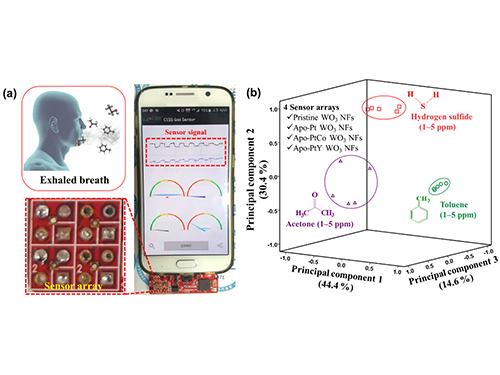 2017 KAIST Tech Fair to Showcase Ten Cutting-Edge Technologies
KAIST will showcase the ten most cutting-edge technologies developed by KAIST faculty and researchers at the 2017 KAIST Tech Fair. The fair will be held on September 12 at the COEX in Seoul. The fair will bring companies, venture capitalists, and tech consultants from around the country to learn about the most commercially potential technology from KAIST.
The ten technologies, all already patented, will be highly relevant for the new industrial trends summed up by the Fourth Industrial Revolution. They include the fields of ICT, unmanned transportation, AI, robotics, IoT, nano, and big data.
The Technology Evaluation Committee, comprised of the heads of the departments at KAIST, patent lawyers, and venture capitalists, selected the ten technologies based on their applicability, innovativeness, and marketability. The selectees will be provided with various commercialization support and services including the manufacturing of prototypes, marketing consultation at home and abroad, as well as handling IPR issues, among others.
KAIST will hold an information session as well as consultations for successful technology commercialization as one of the innovative plans proposed by the KAIST President Sung-Chul Shin. This session will invite 200 entrepreneurs who are interested in the selected technologies.
Associate Vice President of University-Industry Cooperation Kyung Cheol Choi said, “Starting with the selection of 2017 top ten crucial technologies, KAIST will continue supporting technology marketing as well as its successful transfer. KAIST will make effort to carry out university-industry cooperation and find core patent technologies and project ideas in order to stimulate technology commercialization.”
The list of the ten critical patent technologies selected by KAIST is as follows:
▶ Catalyst-Decorated Nanofiber Sensor for Health Monitoring
By Professor Il-Doo Kim (Department of Materials Science and Engineering)
Human breath carries diverse components of diseases such as asthma, lung cancer, type 1 diabetes mellitus, and halitosis. Thus, it is possible to analyze exhaled breath very rapidly with a simple analyzing process and it can detect trace changes in exhaled breath components, which trigger diseases.
The research team developed highly sensitive and selective chemical gas sensors that can detect specific disease, using protein-encapsulated nanocatalysts. They can diagnose certain diseases by analyzing human exhaled breath. This technology enables the early monitoring of various diseases through pattern recognition of biomarker gases associated with the diseases in human exhalation.
The established sensing libraries can detect biomarker species with high sensitivity and selectivity. The team hopes that the new and innovative breath gas analysis platform will be very helpful for reducing medical expenditures and the continuous monitoring of physical conditions.
# Detection of environmental toxic gases, monitoring of body health condition
Figure (a) Mobile device integrated with nanofiber based MEMS sensorsFigure (b) Exhaled breath pattern recognition: principle component analysis for the accurate detection of acetone, hydrogen sulfide, and toluene gases
▶ Technology for a Cancer Cure Using Big Data and Simulating Biological Network By Professor Kwang-Hyun Cho (Department of Bio and Brain Engineering)
The complex and heterogeneous nature of cancer, which results in highly variable drug responses, is a major obstacle in curing cancer. Previous methods to predict drug responses mostly focus on the static analysis of genome-wide alternations, resulting in a limitation for the understanding of cancer heterogeneity and its variable responses.
The research team used a method to integrate cancer genomics data with the dynamics of biological networks for drug response prediction and to design of effective drug combination. It provides a computational framework for evaluating drug efficacies and synergistic effects by combining the attractor landscape analysis of a biological network with the genomic alteration profiles of cancer cells.
This technology can reduce the cost of drug development by predicting drug responses and help selecting more effective new drug targets in consideration of the overall cellular response landscape. It can also provide comprehensive insight into the mechanistic origin of variable drug responses. The patent technology can be applicable to designing more effective and cancer-specific combination therapies.
# Development of targeted anticancer drugs, genetic testing
Figure (a) The computational prediction of drug responses using attractor landscape analysis of network dynamics
▶ Highly Stretchable, Wearable Strain SensorBy Professor O Ok Park (Department of Chemical and Biomolecular Engineering)
Conventional materials for strain sensor are metals or semiconductors, but these materials show a limited range of strain. To improve the stretchability of conventional materials, several projects have been done using novel materials with a high aspect ratio; nevertheless, these projects encountered problems, including complex and expensive processes, poor scalable features, and low controllability of the sensitivity in the manufacturing step.
The research team used a layer-by-layer assembly technique to control the sensitivity of the sensor in a facile and inexpensive method. By using stretchable yarn as a substrate, the graphene strain sensor gained more stretchability.
Through the newly-patented technology, the graphene strain sensor can be fabricated using an all-solution process; therefore, the sensitivity of the sensor can be easily controlled with a repetitive cycle of the coating process. The size of this sensor can be controlled as well, because it depends only on the size of coated substrate.
# Wearable strain sensor, planar strain sensor
Figure (a) Nylon-covered rubber yarn showing linear relationship between the applied strain load and its resistance change
Figure (b) Wool yarn showing an inverse relation of resistance with the applied strain load
▶ Chip & Flash Memory Data Security DeviceBy Professor Yang-Kyu Choi (School of Electrical Engineering)
Using software-based security methods can lead to having problems related to the backtracking of a security function through reverse engineering, the replication of an input value, and the forgery and modification of software. These problems should not be neglected, especially as people are increasingly recognizing the importance of personal information.
To meet the growing demands for new security methods for constructing a more perfect security system, the research team developed a hardware-based security device as well as methods for a higher level of security in the era of IoTs. The principles of the technologies are based on nanotechnology, such as mechanical deformation in a nanowire, electrical degradation in a field-effect transistor (FET), and thermal data erasing stored in the charge trap layer in flash memory. Hence, the security states are extremely safe, compared with software-based security methods and cannot be reverse-engineered by unauthorized users.
This patented technology can be used to improve the security level of logic circuits and flash memory against unauthorized users.
# Financial businesses, the defense industry, private electronics including smartphones, tablets and PCs, electronics for missions in extreme environments
Figure (a) Application for a high level of security in a logic circuit
▶ A Bio-Healthcare Device for Neuroimaging
By Professor Hyeonmin Bae (School of Electrical Engineering)There are no portable brain imaging devices and, as a result, brain diseases are often diagnosed after irreversible symptoms appeared. This can also be linked to an increase in social expenditures as a society ages.
A near-infrared spectroscopy neuroimaging device for functional brain imaging, NIRSIT, utilizes light to detect hemodynamic changes in cerebral blood flow and visualizes brain activation regions in the prefrontal area of the brain in real time.
Unlike any other existing brain imaging devices (i.e. fMRI and conventional fNIRS), NIRSIT has improved its spatial resolution while maintaining complete portability.
Furthermore, NIRSIT is probably the one and only portable and wireless NIRS device, designed to be used for brain research and clinical purposes. A software application allows the raw data extracted from the hemodynamic changes in the brain to be shown in real time on a tablet wirelessly connected to NIRSIT.
Thanks to its easy-to-use features and user-friendly design, both in hardware and in software, NIRSIT will surely set a new paradigm in the brain research and healthcare fields.
# Concussion analysis, wearable stroke monitoring, CPR monitoring, Alzheimer’s disease, neuro rehabilitation, determination of brain death
Figure (a) Image of NIRSIT, Figure (b) Neuroimaging using NIRSIT
▶ Technology for Virtual Creatures with Digitally-Emotional DNA of UsersBy Professor Jong-Hwan Kim (School of Electrical Engineering)
Currently, a large number of IT companies around the world are trying to develop a system that can offer active and emotional services and the interface method is one of the most important issues.
Although most of the existing software agents are equipped with virtual faces and voices, they do not possess a personality similar to humans. Having various personalities, like human beings, can be a charming point for users, which then leads them to have higher satisfaction with the product.
Dr. Kim’s research team developed Darwin C (Digital Agent Reconstruction with Intelligence and Natural Character), a digital agent software that provides an optimized emotional service based on personal big data, such as the user’s conversations, locations, photos, music, etc., collected from smart devices.
With this technology, the digital DNAs of a user (i.e. appearance, voice, and personality DNA) is extracted from personal data stored on various smart devices. Based on the extracted digital DNA, a 3-D software agent can be formed in a smartphone, which characterizes an individual that the user hopes to meet, such as parents, spouse, grandchild, or a celebrity.
The software agents will be expanded from Android devices to home appliances. The team expected that this technology can help customers who want to understand more about a friend or form and maintain interpersonal relations.
# Entertainment, hardware robots for education, healthcare curing depression and loneliness
Figure (a) Overview of the DarwinC technology, Figure (b) Structure of digital DNA
▶ Laser-Integrated Precision Metrological System Technology for Smart Factories By Professor Seung-woo Kim (Department of Mechanical Engineering)
In optical distance metrology, the time-of-flight method of using light pulses permits measuring distances over extensive ranges. However, the measurement precision reaches just a few tens of millimeters at most, mainly because the responsivity of the photodetectors available today is limited to the picosecond range. In addition, one device can measure only one target. For these reasons, a novel technology was devised to overcome the traditional limits of time-of-flight measurement.
This patented technology uses a highly precise, laser-integrated distance measurement system for diagnosing large machines and smart factories. This technology was devised to handle the status (e.g. position, 3-D coordinate, and thermal deformation) of multiple targets simultaneously. It is called the multi-target distance meter (MDM) and was constructed by combining a nonlinear optical crystal with a pair of femtosecond lasers.
This technology is able to measure the distances to multiple targets with a single piece of equipment, and it can easily extend the number of targets by just adding beam-splitting devices. Not only does the technology help by reducing cost and complexity, it also enables real-time quality control in the manufacturing industry.
# Real-time on-axis position inspection of a multiple-lens assembly, long-term thermal displacement monitoring of a large, precise machine, 3-D motion control of a mobile vehicle
Figure (a) Conceptual image of smart factory monitoring using laser-integrated precision metrological system technology
▶ SLAM Technology for Autonomous Robot Navigation in a Dynamic Indoor/Outdoor EnvironmentBy Professor Hyun Myung (Department of Civil & Environmental Engineering)
Dr. Myung’s research team developed SLAM (Simultaneous Localization and Mapping) technology for autonomous robot navigation in dynamic indoor/outdoor environments. Two methods were applied to this technology: a hierarchical graph structure-based 3-D high resolution map building method using a low-cost 2D laser scanner and a magnetic field-based localization method for feature-poor environments.
Existing technology required expensive sensors for outdoor environment. The localization and mapping technique were also not very accurate, especially in dynamic environments. The team wanted to provide robust SLAM in low and high dynamic object environments using the fusion of low-cost sensors, such as magnetics, 2-D LiDAR, and camera sensors.
Through this technology, the accuracy of localization and mapping could be increased to within 10cm, using low-cost sensors. Also, it facilitates localization and mapping even in feature-poor environments.
# Autonomous robot navigation in warehouses, autonomous navigation of self-driving cars, autonomous navigation of AGVs (Automated Guided Vehicles) in smart factories
Figure (a) Built outdoor 3-D mappring using a mobile robot with tilted 2-D LiDAR sensor, Figure (b) Mobile robot system for GPS-less mappring
▶ Technology for Optimizing 5G Beamforming ICBy Songcheol Hong (School of Electrical Engineering)
Dr. Hong’s team introduced a new structure for low-power, subminiature, and highly-linear beamforming IC technology. The patent used in this technology reduced the chip size and the direct current (DC) power dissipations drastically, allowing it to make mmWave beamforming antennas.
Beam-forming technology has emerged as an important area in the field of 5G communications and radar systems. It facilitates communication and signal detection with very low RF power.
The patents can be applied to 5G communication beam-forming ICs and antenna modules in mobile terminals, base stations and terminals in the automotive field. Moreover, they can be used in various mmWave radar systems for automobiles, drones, human computer interfaces, and indoor positioning.
# 5G V2X, IoTs, virtual reality
Figure (a) Active phased array system
▶ Beam Division Multiple Access TechnologyBy Professor Dong Ho Cho (School of Electrical Engineering)
Using a 5G network, a communication infrastructure for supporting high-speed, real-time services requires new technologies that enable 4x4 MIMO transmissions within beam-based wireless systems in a new frequency band and improves spectral efficiency more than ten times compared to LTE in domestic and overseas mobile communication carriers and related industries.
P2BDMA, a pattern or polarization beam division multiple access technology, is a core technology for addressing this demand for 5G networks as it enables 4x4 MIMO transmissions in mmWave frequency bands by utilizing the pattern polarization characteristic of radio waves.
The research team upgraded BDMA technology in which the same frequency resource is reused in more than two spaces by using beamforming. This technology increases the degree of freedom (DOF) of wireless communication channels, and thereby improves the achievable data transmission rate by employing multiple pattern/polarization antennas in the conventional BDMA system. The P2BDMA technique has the advantage of eliminating the frequency shortage problem and increasing the transmission speed while using the wide frequency band in a more efficient manner.
The team expects that this technology will alleviate the frequency shortage problem and CAPEX/OPEX of domestic mobile telecommunication companies, support an increase in sales for related equipment makers to make it internationally competitive, and further play a central role in providing high-speed transmission rates to a large number of IoT devices in the future IoT era.
# Autonomous vehicle, communication infrastructure, mobile access system
Figure (a) Concept of P2BDMA technology
2017.08.30 View 16230
2017 KAIST Tech Fair to Showcase Ten Cutting-Edge Technologies
KAIST will showcase the ten most cutting-edge technologies developed by KAIST faculty and researchers at the 2017 KAIST Tech Fair. The fair will be held on September 12 at the COEX in Seoul. The fair will bring companies, venture capitalists, and tech consultants from around the country to learn about the most commercially potential technology from KAIST.
The ten technologies, all already patented, will be highly relevant for the new industrial trends summed up by the Fourth Industrial Revolution. They include the fields of ICT, unmanned transportation, AI, robotics, IoT, nano, and big data.
The Technology Evaluation Committee, comprised of the heads of the departments at KAIST, patent lawyers, and venture capitalists, selected the ten technologies based on their applicability, innovativeness, and marketability. The selectees will be provided with various commercialization support and services including the manufacturing of prototypes, marketing consultation at home and abroad, as well as handling IPR issues, among others.
KAIST will hold an information session as well as consultations for successful technology commercialization as one of the innovative plans proposed by the KAIST President Sung-Chul Shin. This session will invite 200 entrepreneurs who are interested in the selected technologies.
Associate Vice President of University-Industry Cooperation Kyung Cheol Choi said, “Starting with the selection of 2017 top ten crucial technologies, KAIST will continue supporting technology marketing as well as its successful transfer. KAIST will make effort to carry out university-industry cooperation and find core patent technologies and project ideas in order to stimulate technology commercialization.”
The list of the ten critical patent technologies selected by KAIST is as follows:
▶ Catalyst-Decorated Nanofiber Sensor for Health Monitoring
By Professor Il-Doo Kim (Department of Materials Science and Engineering)
Human breath carries diverse components of diseases such as asthma, lung cancer, type 1 diabetes mellitus, and halitosis. Thus, it is possible to analyze exhaled breath very rapidly with a simple analyzing process and it can detect trace changes in exhaled breath components, which trigger diseases.
The research team developed highly sensitive and selective chemical gas sensors that can detect specific disease, using protein-encapsulated nanocatalysts. They can diagnose certain diseases by analyzing human exhaled breath. This technology enables the early monitoring of various diseases through pattern recognition of biomarker gases associated with the diseases in human exhalation.
The established sensing libraries can detect biomarker species with high sensitivity and selectivity. The team hopes that the new and innovative breath gas analysis platform will be very helpful for reducing medical expenditures and the continuous monitoring of physical conditions.
# Detection of environmental toxic gases, monitoring of body health condition
Figure (a) Mobile device integrated with nanofiber based MEMS sensorsFigure (b) Exhaled breath pattern recognition: principle component analysis for the accurate detection of acetone, hydrogen sulfide, and toluene gases
▶ Technology for a Cancer Cure Using Big Data and Simulating Biological Network By Professor Kwang-Hyun Cho (Department of Bio and Brain Engineering)
The complex and heterogeneous nature of cancer, which results in highly variable drug responses, is a major obstacle in curing cancer. Previous methods to predict drug responses mostly focus on the static analysis of genome-wide alternations, resulting in a limitation for the understanding of cancer heterogeneity and its variable responses.
The research team used a method to integrate cancer genomics data with the dynamics of biological networks for drug response prediction and to design of effective drug combination. It provides a computational framework for evaluating drug efficacies and synergistic effects by combining the attractor landscape analysis of a biological network with the genomic alteration profiles of cancer cells.
This technology can reduce the cost of drug development by predicting drug responses and help selecting more effective new drug targets in consideration of the overall cellular response landscape. It can also provide comprehensive insight into the mechanistic origin of variable drug responses. The patent technology can be applicable to designing more effective and cancer-specific combination therapies.
# Development of targeted anticancer drugs, genetic testing
Figure (a) The computational prediction of drug responses using attractor landscape analysis of network dynamics
▶ Highly Stretchable, Wearable Strain SensorBy Professor O Ok Park (Department of Chemical and Biomolecular Engineering)
Conventional materials for strain sensor are metals or semiconductors, but these materials show a limited range of strain. To improve the stretchability of conventional materials, several projects have been done using novel materials with a high aspect ratio; nevertheless, these projects encountered problems, including complex and expensive processes, poor scalable features, and low controllability of the sensitivity in the manufacturing step.
The research team used a layer-by-layer assembly technique to control the sensitivity of the sensor in a facile and inexpensive method. By using stretchable yarn as a substrate, the graphene strain sensor gained more stretchability.
Through the newly-patented technology, the graphene strain sensor can be fabricated using an all-solution process; therefore, the sensitivity of the sensor can be easily controlled with a repetitive cycle of the coating process. The size of this sensor can be controlled as well, because it depends only on the size of coated substrate.
# Wearable strain sensor, planar strain sensor
Figure (a) Nylon-covered rubber yarn showing linear relationship between the applied strain load and its resistance change
Figure (b) Wool yarn showing an inverse relation of resistance with the applied strain load
▶ Chip & Flash Memory Data Security DeviceBy Professor Yang-Kyu Choi (School of Electrical Engineering)
Using software-based security methods can lead to having problems related to the backtracking of a security function through reverse engineering, the replication of an input value, and the forgery and modification of software. These problems should not be neglected, especially as people are increasingly recognizing the importance of personal information.
To meet the growing demands for new security methods for constructing a more perfect security system, the research team developed a hardware-based security device as well as methods for a higher level of security in the era of IoTs. The principles of the technologies are based on nanotechnology, such as mechanical deformation in a nanowire, electrical degradation in a field-effect transistor (FET), and thermal data erasing stored in the charge trap layer in flash memory. Hence, the security states are extremely safe, compared with software-based security methods and cannot be reverse-engineered by unauthorized users.
This patented technology can be used to improve the security level of logic circuits and flash memory against unauthorized users.
# Financial businesses, the defense industry, private electronics including smartphones, tablets and PCs, electronics for missions in extreme environments
Figure (a) Application for a high level of security in a logic circuit
▶ A Bio-Healthcare Device for Neuroimaging
By Professor Hyeonmin Bae (School of Electrical Engineering)There are no portable brain imaging devices and, as a result, brain diseases are often diagnosed after irreversible symptoms appeared. This can also be linked to an increase in social expenditures as a society ages.
A near-infrared spectroscopy neuroimaging device for functional brain imaging, NIRSIT, utilizes light to detect hemodynamic changes in cerebral blood flow and visualizes brain activation regions in the prefrontal area of the brain in real time.
Unlike any other existing brain imaging devices (i.e. fMRI and conventional fNIRS), NIRSIT has improved its spatial resolution while maintaining complete portability.
Furthermore, NIRSIT is probably the one and only portable and wireless NIRS device, designed to be used for brain research and clinical purposes. A software application allows the raw data extracted from the hemodynamic changes in the brain to be shown in real time on a tablet wirelessly connected to NIRSIT.
Thanks to its easy-to-use features and user-friendly design, both in hardware and in software, NIRSIT will surely set a new paradigm in the brain research and healthcare fields.
# Concussion analysis, wearable stroke monitoring, CPR monitoring, Alzheimer’s disease, neuro rehabilitation, determination of brain death
Figure (a) Image of NIRSIT, Figure (b) Neuroimaging using NIRSIT
▶ Technology for Virtual Creatures with Digitally-Emotional DNA of UsersBy Professor Jong-Hwan Kim (School of Electrical Engineering)
Currently, a large number of IT companies around the world are trying to develop a system that can offer active and emotional services and the interface method is one of the most important issues.
Although most of the existing software agents are equipped with virtual faces and voices, they do not possess a personality similar to humans. Having various personalities, like human beings, can be a charming point for users, which then leads them to have higher satisfaction with the product.
Dr. Kim’s research team developed Darwin C (Digital Agent Reconstruction with Intelligence and Natural Character), a digital agent software that provides an optimized emotional service based on personal big data, such as the user’s conversations, locations, photos, music, etc., collected from smart devices.
With this technology, the digital DNAs of a user (i.e. appearance, voice, and personality DNA) is extracted from personal data stored on various smart devices. Based on the extracted digital DNA, a 3-D software agent can be formed in a smartphone, which characterizes an individual that the user hopes to meet, such as parents, spouse, grandchild, or a celebrity.
The software agents will be expanded from Android devices to home appliances. The team expected that this technology can help customers who want to understand more about a friend or form and maintain interpersonal relations.
# Entertainment, hardware robots for education, healthcare curing depression and loneliness
Figure (a) Overview of the DarwinC technology, Figure (b) Structure of digital DNA
▶ Laser-Integrated Precision Metrological System Technology for Smart Factories By Professor Seung-woo Kim (Department of Mechanical Engineering)
In optical distance metrology, the time-of-flight method of using light pulses permits measuring distances over extensive ranges. However, the measurement precision reaches just a few tens of millimeters at most, mainly because the responsivity of the photodetectors available today is limited to the picosecond range. In addition, one device can measure only one target. For these reasons, a novel technology was devised to overcome the traditional limits of time-of-flight measurement.
This patented technology uses a highly precise, laser-integrated distance measurement system for diagnosing large machines and smart factories. This technology was devised to handle the status (e.g. position, 3-D coordinate, and thermal deformation) of multiple targets simultaneously. It is called the multi-target distance meter (MDM) and was constructed by combining a nonlinear optical crystal with a pair of femtosecond lasers.
This technology is able to measure the distances to multiple targets with a single piece of equipment, and it can easily extend the number of targets by just adding beam-splitting devices. Not only does the technology help by reducing cost and complexity, it also enables real-time quality control in the manufacturing industry.
# Real-time on-axis position inspection of a multiple-lens assembly, long-term thermal displacement monitoring of a large, precise machine, 3-D motion control of a mobile vehicle
Figure (a) Conceptual image of smart factory monitoring using laser-integrated precision metrological system technology
▶ SLAM Technology for Autonomous Robot Navigation in a Dynamic Indoor/Outdoor EnvironmentBy Professor Hyun Myung (Department of Civil & Environmental Engineering)
Dr. Myung’s research team developed SLAM (Simultaneous Localization and Mapping) technology for autonomous robot navigation in dynamic indoor/outdoor environments. Two methods were applied to this technology: a hierarchical graph structure-based 3-D high resolution map building method using a low-cost 2D laser scanner and a magnetic field-based localization method for feature-poor environments.
Existing technology required expensive sensors for outdoor environment. The localization and mapping technique were also not very accurate, especially in dynamic environments. The team wanted to provide robust SLAM in low and high dynamic object environments using the fusion of low-cost sensors, such as magnetics, 2-D LiDAR, and camera sensors.
Through this technology, the accuracy of localization and mapping could be increased to within 10cm, using low-cost sensors. Also, it facilitates localization and mapping even in feature-poor environments.
# Autonomous robot navigation in warehouses, autonomous navigation of self-driving cars, autonomous navigation of AGVs (Automated Guided Vehicles) in smart factories
Figure (a) Built outdoor 3-D mappring using a mobile robot with tilted 2-D LiDAR sensor, Figure (b) Mobile robot system for GPS-less mappring
▶ Technology for Optimizing 5G Beamforming ICBy Songcheol Hong (School of Electrical Engineering)
Dr. Hong’s team introduced a new structure for low-power, subminiature, and highly-linear beamforming IC technology. The patent used in this technology reduced the chip size and the direct current (DC) power dissipations drastically, allowing it to make mmWave beamforming antennas.
Beam-forming technology has emerged as an important area in the field of 5G communications and radar systems. It facilitates communication and signal detection with very low RF power.
The patents can be applied to 5G communication beam-forming ICs and antenna modules in mobile terminals, base stations and terminals in the automotive field. Moreover, they can be used in various mmWave radar systems for automobiles, drones, human computer interfaces, and indoor positioning.
# 5G V2X, IoTs, virtual reality
Figure (a) Active phased array system
▶ Beam Division Multiple Access TechnologyBy Professor Dong Ho Cho (School of Electrical Engineering)
Using a 5G network, a communication infrastructure for supporting high-speed, real-time services requires new technologies that enable 4x4 MIMO transmissions within beam-based wireless systems in a new frequency band and improves spectral efficiency more than ten times compared to LTE in domestic and overseas mobile communication carriers and related industries.
P2BDMA, a pattern or polarization beam division multiple access technology, is a core technology for addressing this demand for 5G networks as it enables 4x4 MIMO transmissions in mmWave frequency bands by utilizing the pattern polarization characteristic of radio waves.
The research team upgraded BDMA technology in which the same frequency resource is reused in more than two spaces by using beamforming. This technology increases the degree of freedom (DOF) of wireless communication channels, and thereby improves the achievable data transmission rate by employing multiple pattern/polarization antennas in the conventional BDMA system. The P2BDMA technique has the advantage of eliminating the frequency shortage problem and increasing the transmission speed while using the wide frequency band in a more efficient manner.
The team expects that this technology will alleviate the frequency shortage problem and CAPEX/OPEX of domestic mobile telecommunication companies, support an increase in sales for related equipment makers to make it internationally competitive, and further play a central role in providing high-speed transmission rates to a large number of IoT devices in the future IoT era.
# Autonomous vehicle, communication infrastructure, mobile access system
Figure (a) Concept of P2BDMA technology
2017.08.30 View 16230 -
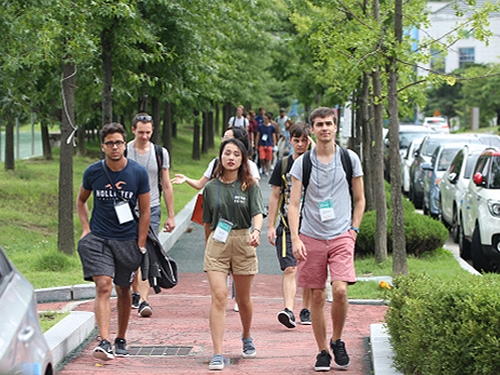 International Students Start a New Semester at KAIST
(International students during a campus tour)
The 2017 fall semester began on August 28 and new and returning students are filling the campus. Our international students are one of the reasons the campus is becoming more dynamic and energetic.
It was easy to see groups of smiling international students walking around the campus. Every semester, KAIST welcomes hundreds of students from around the world to give them the opportunity to study at a world-leading university in science and technology.
This semester, approximately 150 students in degree-seeking programs and 220 exchange students from a total of 74 countries, including Germany, the United States, and France entered KAIST.
(Frederik Hansen, a student from DTU)
Frederik Hansen is an exchange student who came to KAIST this semester from Copenhagen, Denmark. He completed the undergraduate program at the Technical University of Denmark (DTU) and is now pursuing a master’s degree.
He decided to join KAIST because he felt the university is up-to-date with subjects in his field of interest.
Frederik, who majored in mechanical engineering, looks forward taking classes related to robotics and solid mechanics. Noting that it’s his first time visiting Asia, he hopes to experience and learn about Korean culture.
In an effort to help foreign students’ soft landing in KAIST, the International Office held a series of orientation programs over three days. The buddy program provides international freshmen with an opportunity to make Korean friends for a more successful life at KAIST, while giving domestic students a chance to learn about different cultures and perhaps build on the global capacity required for becoming a global leader. Information sessions also provided educational information that can support international students living in KAIST. Finally, the counseling program gives information about the KAIST counseling center and ISSS (International Scholar and Student Service). It provides a psychometric test service to those who wish to take it.
If you are interested in pursuing academic programs at KAIST, please visit the International Office via http://io.kaist.ac.kr/index.do .
2017.08.30 View 6906
International Students Start a New Semester at KAIST
(International students during a campus tour)
The 2017 fall semester began on August 28 and new and returning students are filling the campus. Our international students are one of the reasons the campus is becoming more dynamic and energetic.
It was easy to see groups of smiling international students walking around the campus. Every semester, KAIST welcomes hundreds of students from around the world to give them the opportunity to study at a world-leading university in science and technology.
This semester, approximately 150 students in degree-seeking programs and 220 exchange students from a total of 74 countries, including Germany, the United States, and France entered KAIST.
(Frederik Hansen, a student from DTU)
Frederik Hansen is an exchange student who came to KAIST this semester from Copenhagen, Denmark. He completed the undergraduate program at the Technical University of Denmark (DTU) and is now pursuing a master’s degree.
He decided to join KAIST because he felt the university is up-to-date with subjects in his field of interest.
Frederik, who majored in mechanical engineering, looks forward taking classes related to robotics and solid mechanics. Noting that it’s his first time visiting Asia, he hopes to experience and learn about Korean culture.
In an effort to help foreign students’ soft landing in KAIST, the International Office held a series of orientation programs over three days. The buddy program provides international freshmen with an opportunity to make Korean friends for a more successful life at KAIST, while giving domestic students a chance to learn about different cultures and perhaps build on the global capacity required for becoming a global leader. Information sessions also provided educational information that can support international students living in KAIST. Finally, the counseling program gives information about the KAIST counseling center and ISSS (International Scholar and Student Service). It provides a psychometric test service to those who wish to take it.
If you are interested in pursuing academic programs at KAIST, please visit the International Office via http://io.kaist.ac.kr/index.do .
2017.08.30 View 6906 -
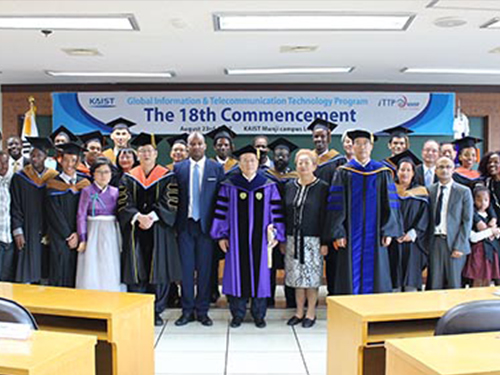 Global ITTP Graduates 12 Public Officials from 11 Countries
The 18th Global Information and Telecommunication Technology Program (ITTP) graduated 12 public officials from 11 countries in a commencement ceremony held on August 23.
Distinguished guests, faculty, and family of graduates including President Sung-Chul Shin, the Chair of the School of Business and Technology Youngsun Kown, and the Director of Global ITTP Jaejung Rho attended the commencement. Ghana Ambassador Joseph Agoe, Mrs. Lyudmila Fen, the spouse of Uzbekistan Ambassador Vitali Fen, and other dignitaries came to congratulate the 12 master’s students on their successful graduation.
The Global ITTP was launched in 2006 and offers customized master’s and doctoral degree programs to elite public officials from diverse countries on information and communication technology. This program plays a vital role for transferring Korea’s advanced ICT to countries whose industries are in the budding stages. Since 2006, the program has produced 181 alumni (48 PhDs and 133 masters) from 60 countries.
In his congratulatory message during the ceremony, President Shin congratulated the graduates on the long journey they had been through while completing their courses and welcomed the newest addition of KAIST 12 alumni.
“Back in the 1960s, Korea was one of the poorest countries in the world. Korea’s GDP stood at less than 100 US dollars. Through it all, Korean companies are now taking the lead in the global high-tech market, emerging as movers and shakers. I believe that ‘VIP’ changed it all; in other words, visionary leaders, innovative ideas, and passionate people all combined to make the difference in Korea,” said President Shin.
He also shared a new formula for success in the wake of the new industrial environment of the Fourth Industrial Revolution with the graduates who will soon begin a new ambitious professional journey in their countries. “I think Innovation, Collaboration, and Speed will be the key words to make a difference in every sector of each and every country in this dynamic new era. When making a national development strategies, please keep in mind ‘ICS’ for the development of your country as well as the world’s sustainable development.”
Finally, he said, “As a KAIST alumnus, always be sincere wherever you work and whatever you do during your service. I advise you to become a leader who is doing one’s best at all times.”
☞ Link to the 18th commencement address
2017.08.24 View 7491
Global ITTP Graduates 12 Public Officials from 11 Countries
The 18th Global Information and Telecommunication Technology Program (ITTP) graduated 12 public officials from 11 countries in a commencement ceremony held on August 23.
Distinguished guests, faculty, and family of graduates including President Sung-Chul Shin, the Chair of the School of Business and Technology Youngsun Kown, and the Director of Global ITTP Jaejung Rho attended the commencement. Ghana Ambassador Joseph Agoe, Mrs. Lyudmila Fen, the spouse of Uzbekistan Ambassador Vitali Fen, and other dignitaries came to congratulate the 12 master’s students on their successful graduation.
The Global ITTP was launched in 2006 and offers customized master’s and doctoral degree programs to elite public officials from diverse countries on information and communication technology. This program plays a vital role for transferring Korea’s advanced ICT to countries whose industries are in the budding stages. Since 2006, the program has produced 181 alumni (48 PhDs and 133 masters) from 60 countries.
In his congratulatory message during the ceremony, President Shin congratulated the graduates on the long journey they had been through while completing their courses and welcomed the newest addition of KAIST 12 alumni.
“Back in the 1960s, Korea was one of the poorest countries in the world. Korea’s GDP stood at less than 100 US dollars. Through it all, Korean companies are now taking the lead in the global high-tech market, emerging as movers and shakers. I believe that ‘VIP’ changed it all; in other words, visionary leaders, innovative ideas, and passionate people all combined to make the difference in Korea,” said President Shin.
He also shared a new formula for success in the wake of the new industrial environment of the Fourth Industrial Revolution with the graduates who will soon begin a new ambitious professional journey in their countries. “I think Innovation, Collaboration, and Speed will be the key words to make a difference in every sector of each and every country in this dynamic new era. When making a national development strategies, please keep in mind ‘ICS’ for the development of your country as well as the world’s sustainable development.”
Finally, he said, “As a KAIST alumnus, always be sincere wherever you work and whatever you do during your service. I advise you to become a leader who is doing one’s best at all times.”
☞ Link to the 18th commencement address
2017.08.24 View 7491 -
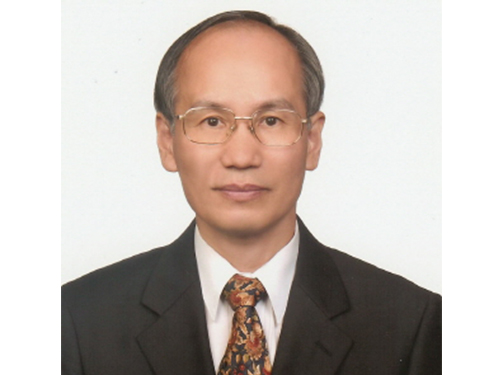 Professor Dan Keun Sung Endows Scholarship in Honor of His Retirement
Professor Dan Keun Sung in the School of Electrical Engineering contributed a 100 million KRW scholarship fund this month to KAIST to mark his retirement after more than three decades of work.
“As my retirement date comes closer, I have been thinking about what I could do for the school. I wanted to leave something behind, even though it’s small, for my lifelong school and students. I am hoping that this scholarship fund will benefit the members of KAIST.”
This isn’t his first time making a donation to KAIST. In 2013, Professor Sung donated ten million KRW, which was his cash prize from the 9th Haedong Academic Award of The Korean Institute of Communications and Information Sciences (KICS). At that time, Professor Sung had the chance to create a scholarship fund in his name; however, he wanted to highlight that the scholarship fund was for ‘someone,’ not created by ‘someone.’ In that sense, his scholarship fund was created with no name to benefit students in the School of Electrical Engineering. His colleagues and students supported his idea. Professor Seonghwan Cho, students, and alumni also participated in fund raising efforts, which reached 55 million KRW in total.
Professor Sung emphasized, “Donations should always be remembered, no matter how small they are.” He then explained his purpose for creating the scholarship fund by saying, “Fundraising can be truly meaningful to contributors, knowing that their money is going to supporting the school and students.”
Professor Sung, a fellow of the Institute of Electrical and Electronics Engineers (IEEE) Communication Society, started his post at KAIST in 1986. For the past 30 years, he has devoted himself to fostering young scholars and studying in the area of information and communication. He also participated in developing technologies for the resource management of various future cellular components, such as satellites, switchboards, and signaling networks.
2017.08.11 View 9862
Professor Dan Keun Sung Endows Scholarship in Honor of His Retirement
Professor Dan Keun Sung in the School of Electrical Engineering contributed a 100 million KRW scholarship fund this month to KAIST to mark his retirement after more than three decades of work.
“As my retirement date comes closer, I have been thinking about what I could do for the school. I wanted to leave something behind, even though it’s small, for my lifelong school and students. I am hoping that this scholarship fund will benefit the members of KAIST.”
This isn’t his first time making a donation to KAIST. In 2013, Professor Sung donated ten million KRW, which was his cash prize from the 9th Haedong Academic Award of The Korean Institute of Communications and Information Sciences (KICS). At that time, Professor Sung had the chance to create a scholarship fund in his name; however, he wanted to highlight that the scholarship fund was for ‘someone,’ not created by ‘someone.’ In that sense, his scholarship fund was created with no name to benefit students in the School of Electrical Engineering. His colleagues and students supported his idea. Professor Seonghwan Cho, students, and alumni also participated in fund raising efforts, which reached 55 million KRW in total.
Professor Sung emphasized, “Donations should always be remembered, no matter how small they are.” He then explained his purpose for creating the scholarship fund by saying, “Fundraising can be truly meaningful to contributors, knowing that their money is going to supporting the school and students.”
Professor Sung, a fellow of the Institute of Electrical and Electronics Engineers (IEEE) Communication Society, started his post at KAIST in 1986. For the past 30 years, he has devoted himself to fostering young scholars and studying in the area of information and communication. He also participated in developing technologies for the resource management of various future cellular components, such as satellites, switchboards, and signaling networks.
2017.08.11 View 9862